Understanding Psychological Conditions Influencing Health & Sport
VerifiedAdded on 2023/06/09
|10
|2249
|68
Report
AI Summary
This report provides an overview of several psychological conditions and their impact on healthy behavior and sports. It discusses conditions such as anxiety, bipolar disorder, eating disorders, substance abuse, exercise addiction, schizophrenia, borderline personality disorder, and post-traumatic stress disorder (PTSD). For each condition, the report outlines the symptoms, causes, and effects on health and sports performance, as well as potential treatments. The report emphasizes the importance of addressing these psychological conditions to promote overall well-being and optimize performance in sports. Desklib offers a wealth of similar resources for students seeking to deepen their understanding of these topics.
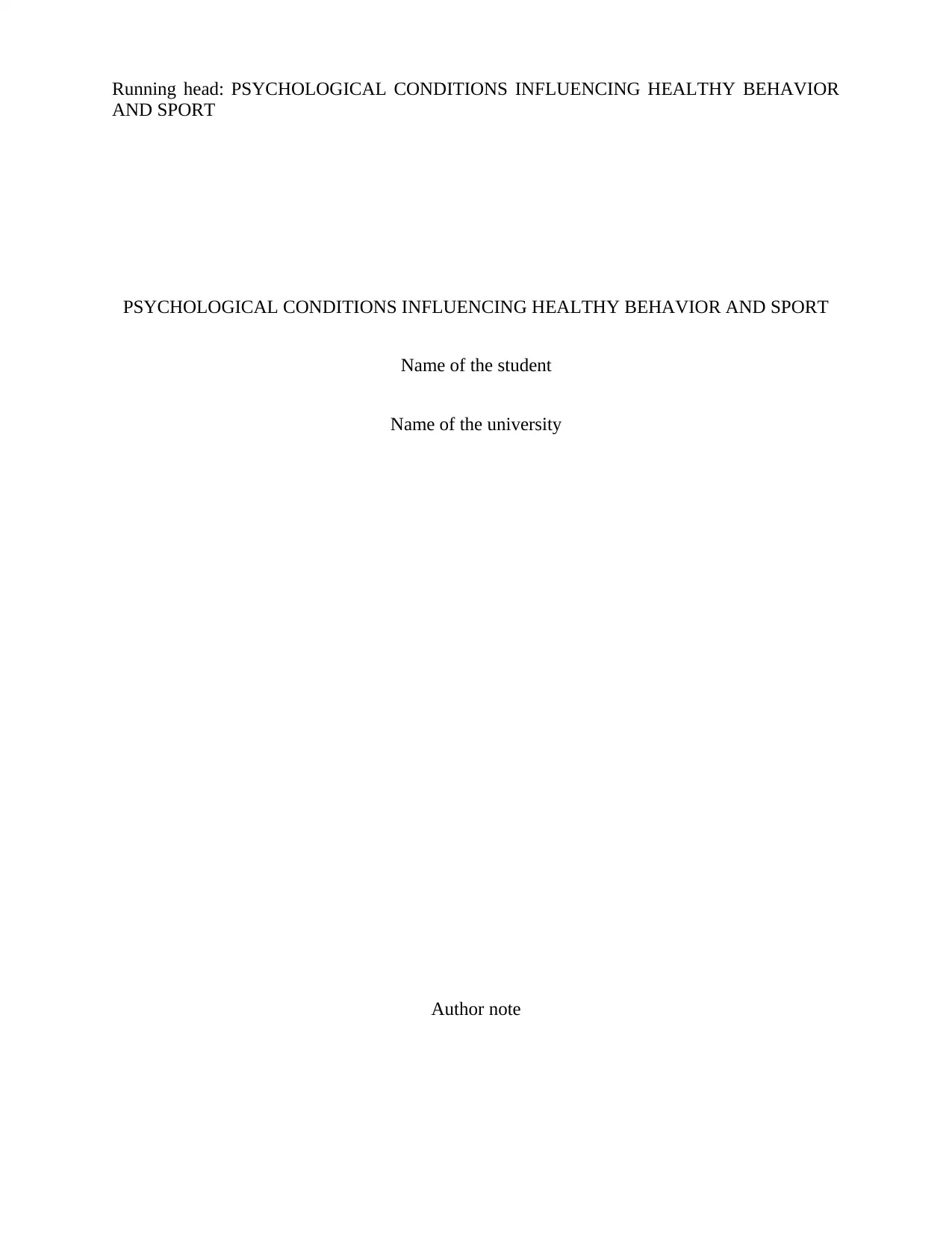
Running head: PSYCHOLOGICAL CONDITIONS INFLUENCING HEALTHY BEHAVIOR
AND SPORT
PSYCHOLOGICAL CONDITIONS INFLUENCING HEALTHY BEHAVIOR AND SPORT
Name of the student
Name of the university
Author note
AND SPORT
PSYCHOLOGICAL CONDITIONS INFLUENCING HEALTHY BEHAVIOR AND SPORT
Name of the student
Name of the university
Author note
Paraphrase This Document
Need a fresh take? Get an instant paraphrase of this document with our AI Paraphraser
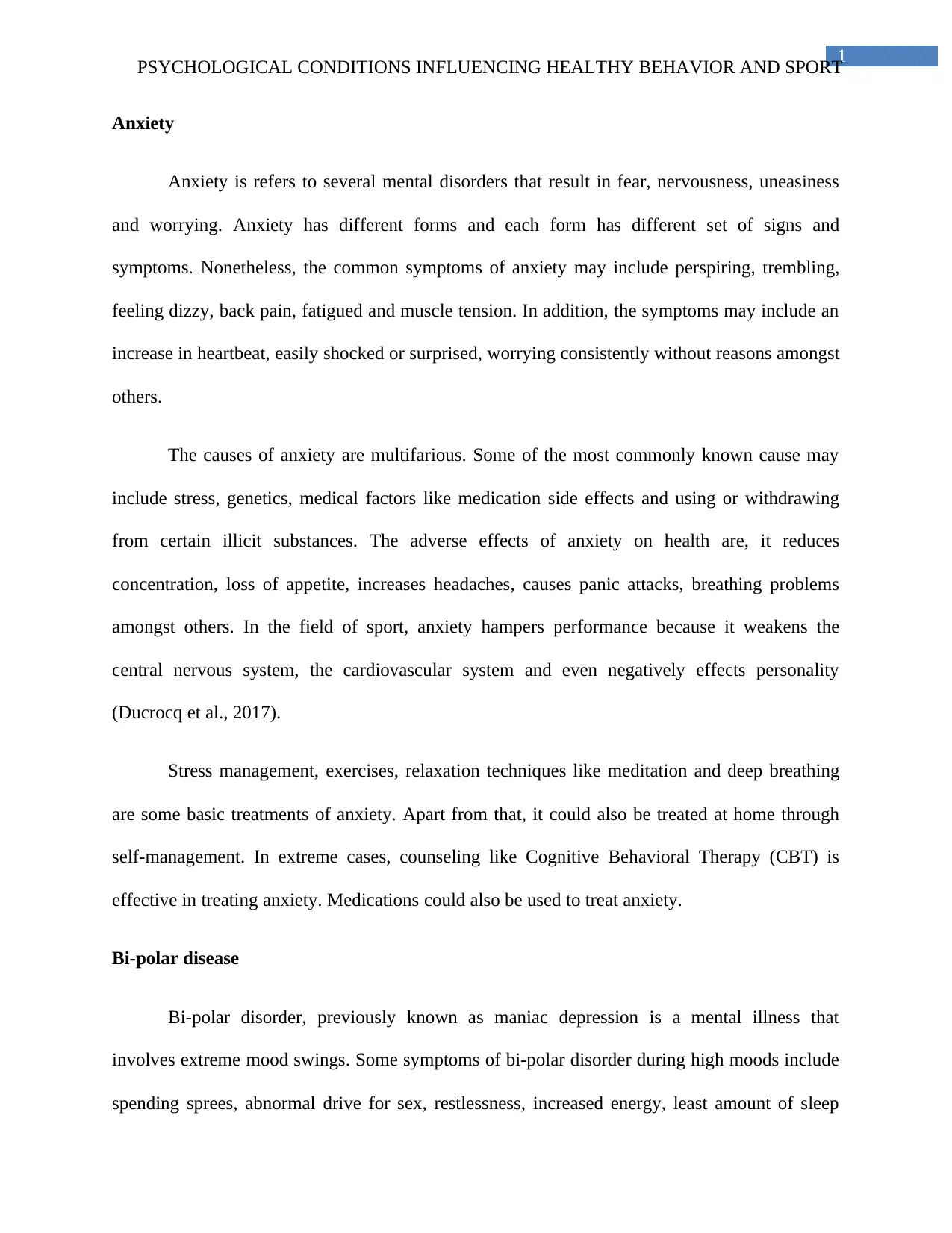
1
PSYCHOLOGICAL CONDITIONS INFLUENCING HEALTHY BEHAVIOR AND SPORT
Anxiety
Anxiety is refers to several mental disorders that result in fear, nervousness, uneasiness
and worrying. Anxiety has different forms and each form has different set of signs and
symptoms. Nonetheless, the common symptoms of anxiety may include perspiring, trembling,
feeling dizzy, back pain, fatigued and muscle tension. In addition, the symptoms may include an
increase in heartbeat, easily shocked or surprised, worrying consistently without reasons amongst
others.
The causes of anxiety are multifarious. Some of the most commonly known cause may
include stress, genetics, medical factors like medication side effects and using or withdrawing
from certain illicit substances. The adverse effects of anxiety on health are, it reduces
concentration, loss of appetite, increases headaches, causes panic attacks, breathing problems
amongst others. In the field of sport, anxiety hampers performance because it weakens the
central nervous system, the cardiovascular system and even negatively effects personality
(Ducrocq et al., 2017).
Stress management, exercises, relaxation techniques like meditation and deep breathing
are some basic treatments of anxiety. Apart from that, it could also be treated at home through
self-management. In extreme cases, counseling like Cognitive Behavioral Therapy (CBT) is
effective in treating anxiety. Medications could also be used to treat anxiety.
Bi-polar disease
Bi-polar disorder, previously known as maniac depression is a mental illness that
involves extreme mood swings. Some symptoms of bi-polar disorder during high moods include
spending sprees, abnormal drive for sex, restlessness, increased energy, least amount of sleep
PSYCHOLOGICAL CONDITIONS INFLUENCING HEALTHY BEHAVIOR AND SPORT
Anxiety
Anxiety is refers to several mental disorders that result in fear, nervousness, uneasiness
and worrying. Anxiety has different forms and each form has different set of signs and
symptoms. Nonetheless, the common symptoms of anxiety may include perspiring, trembling,
feeling dizzy, back pain, fatigued and muscle tension. In addition, the symptoms may include an
increase in heartbeat, easily shocked or surprised, worrying consistently without reasons amongst
others.
The causes of anxiety are multifarious. Some of the most commonly known cause may
include stress, genetics, medical factors like medication side effects and using or withdrawing
from certain illicit substances. The adverse effects of anxiety on health are, it reduces
concentration, loss of appetite, increases headaches, causes panic attacks, breathing problems
amongst others. In the field of sport, anxiety hampers performance because it weakens the
central nervous system, the cardiovascular system and even negatively effects personality
(Ducrocq et al., 2017).
Stress management, exercises, relaxation techniques like meditation and deep breathing
are some basic treatments of anxiety. Apart from that, it could also be treated at home through
self-management. In extreme cases, counseling like Cognitive Behavioral Therapy (CBT) is
effective in treating anxiety. Medications could also be used to treat anxiety.
Bi-polar disease
Bi-polar disorder, previously known as maniac depression is a mental illness that
involves extreme mood swings. Some symptoms of bi-polar disorder during high moods include
spending sprees, abnormal drive for sex, restlessness, increased energy, least amount of sleep
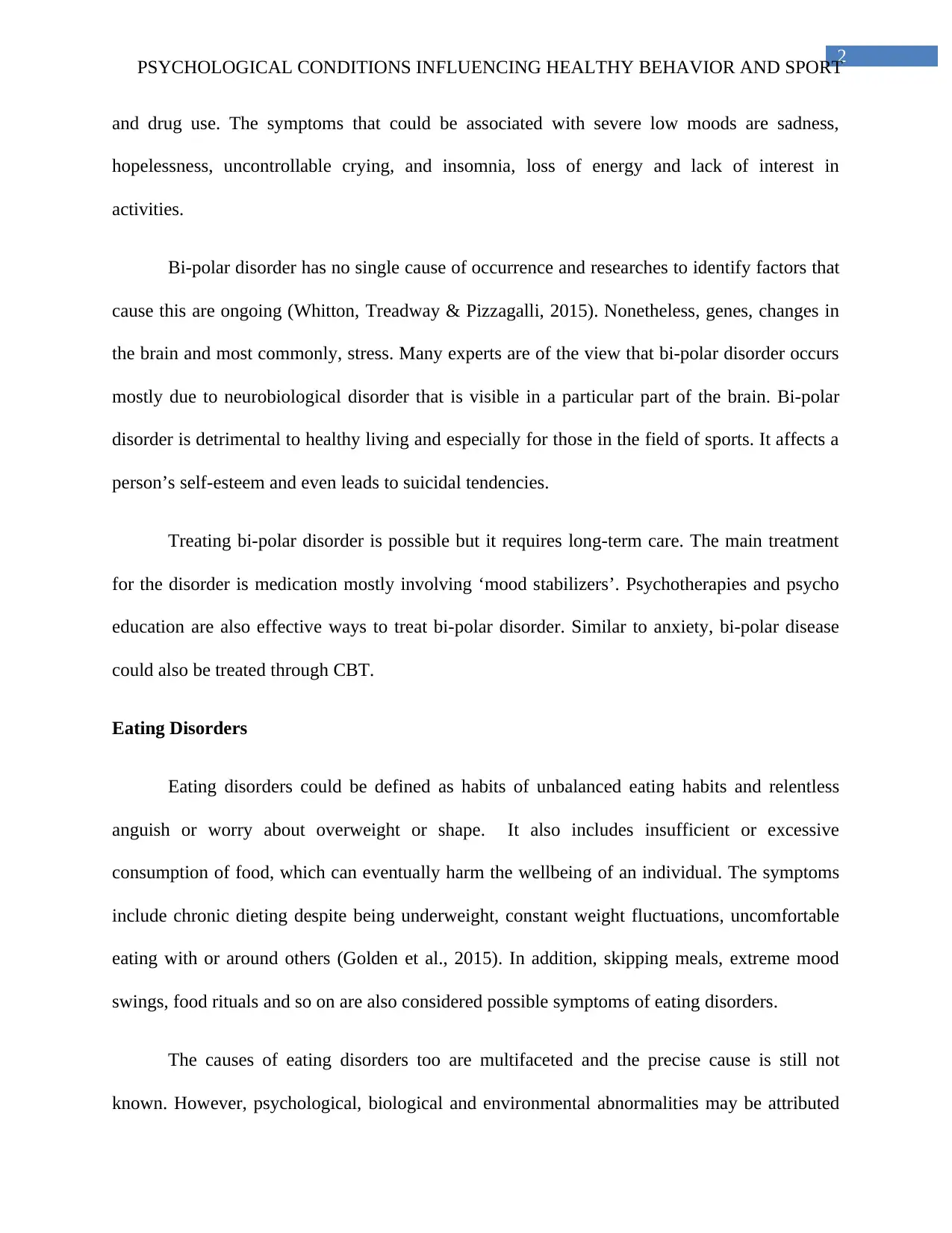
2
PSYCHOLOGICAL CONDITIONS INFLUENCING HEALTHY BEHAVIOR AND SPORT
and drug use. The symptoms that could be associated with severe low moods are sadness,
hopelessness, uncontrollable crying, and insomnia, loss of energy and lack of interest in
activities.
Bi-polar disorder has no single cause of occurrence and researches to identify factors that
cause this are ongoing (Whitton, Treadway & Pizzagalli, 2015). Nonetheless, genes, changes in
the brain and most commonly, stress. Many experts are of the view that bi-polar disorder occurs
mostly due to neurobiological disorder that is visible in a particular part of the brain. Bi-polar
disorder is detrimental to healthy living and especially for those in the field of sports. It affects a
person’s self-esteem and even leads to suicidal tendencies.
Treating bi-polar disorder is possible but it requires long-term care. The main treatment
for the disorder is medication mostly involving ‘mood stabilizers’. Psychotherapies and psycho
education are also effective ways to treat bi-polar disorder. Similar to anxiety, bi-polar disease
could also be treated through CBT.
Eating Disorders
Eating disorders could be defined as habits of unbalanced eating habits and relentless
anguish or worry about overweight or shape. It also includes insufficient or excessive
consumption of food, which can eventually harm the wellbeing of an individual. The symptoms
include chronic dieting despite being underweight, constant weight fluctuations, uncomfortable
eating with or around others (Golden et al., 2015). In addition, skipping meals, extreme mood
swings, food rituals and so on are also considered possible symptoms of eating disorders.
The causes of eating disorders too are multifaceted and the precise cause is still not
known. However, psychological, biological and environmental abnormalities may be attributed
PSYCHOLOGICAL CONDITIONS INFLUENCING HEALTHY BEHAVIOR AND SPORT
and drug use. The symptoms that could be associated with severe low moods are sadness,
hopelessness, uncontrollable crying, and insomnia, loss of energy and lack of interest in
activities.
Bi-polar disorder has no single cause of occurrence and researches to identify factors that
cause this are ongoing (Whitton, Treadway & Pizzagalli, 2015). Nonetheless, genes, changes in
the brain and most commonly, stress. Many experts are of the view that bi-polar disorder occurs
mostly due to neurobiological disorder that is visible in a particular part of the brain. Bi-polar
disorder is detrimental to healthy living and especially for those in the field of sports. It affects a
person’s self-esteem and even leads to suicidal tendencies.
Treating bi-polar disorder is possible but it requires long-term care. The main treatment
for the disorder is medication mostly involving ‘mood stabilizers’. Psychotherapies and psycho
education are also effective ways to treat bi-polar disorder. Similar to anxiety, bi-polar disease
could also be treated through CBT.
Eating Disorders
Eating disorders could be defined as habits of unbalanced eating habits and relentless
anguish or worry about overweight or shape. It also includes insufficient or excessive
consumption of food, which can eventually harm the wellbeing of an individual. The symptoms
include chronic dieting despite being underweight, constant weight fluctuations, uncomfortable
eating with or around others (Golden et al., 2015). In addition, skipping meals, extreme mood
swings, food rituals and so on are also considered possible symptoms of eating disorders.
The causes of eating disorders too are multifaceted and the precise cause is still not
known. However, psychological, biological and environmental abnormalities may be attributed
⊘ This is a preview!⊘
Do you want full access?
Subscribe today to unlock all pages.

Trusted by 1+ million students worldwide
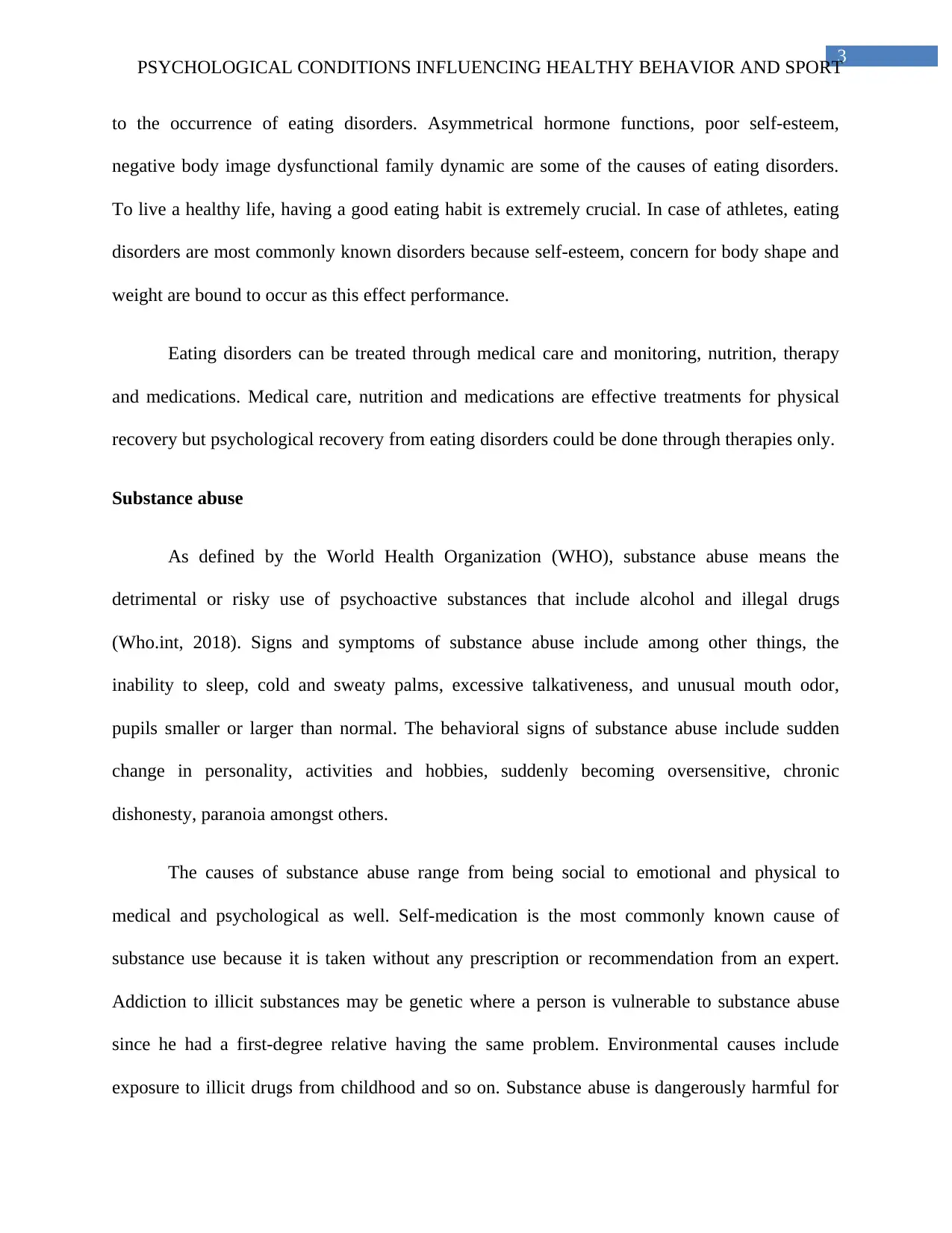
3
PSYCHOLOGICAL CONDITIONS INFLUENCING HEALTHY BEHAVIOR AND SPORT
to the occurrence of eating disorders. Asymmetrical hormone functions, poor self-esteem,
negative body image dysfunctional family dynamic are some of the causes of eating disorders.
To live a healthy life, having a good eating habit is extremely crucial. In case of athletes, eating
disorders are most commonly known disorders because self-esteem, concern for body shape and
weight are bound to occur as this effect performance.
Eating disorders can be treated through medical care and monitoring, nutrition, therapy
and medications. Medical care, nutrition and medications are effective treatments for physical
recovery but psychological recovery from eating disorders could be done through therapies only.
Substance abuse
As defined by the World Health Organization (WHO), substance abuse means the
detrimental or risky use of psychoactive substances that include alcohol and illegal drugs
(Who.int, 2018). Signs and symptoms of substance abuse include among other things, the
inability to sleep, cold and sweaty palms, excessive talkativeness, and unusual mouth odor,
pupils smaller or larger than normal. The behavioral signs of substance abuse include sudden
change in personality, activities and hobbies, suddenly becoming oversensitive, chronic
dishonesty, paranoia amongst others.
The causes of substance abuse range from being social to emotional and physical to
medical and psychological as well. Self-medication is the most commonly known cause of
substance use because it is taken without any prescription or recommendation from an expert.
Addiction to illicit substances may be genetic where a person is vulnerable to substance abuse
since he had a first-degree relative having the same problem. Environmental causes include
exposure to illicit drugs from childhood and so on. Substance abuse is dangerously harmful for
PSYCHOLOGICAL CONDITIONS INFLUENCING HEALTHY BEHAVIOR AND SPORT
to the occurrence of eating disorders. Asymmetrical hormone functions, poor self-esteem,
negative body image dysfunctional family dynamic are some of the causes of eating disorders.
To live a healthy life, having a good eating habit is extremely crucial. In case of athletes, eating
disorders are most commonly known disorders because self-esteem, concern for body shape and
weight are bound to occur as this effect performance.
Eating disorders can be treated through medical care and monitoring, nutrition, therapy
and medications. Medical care, nutrition and medications are effective treatments for physical
recovery but psychological recovery from eating disorders could be done through therapies only.
Substance abuse
As defined by the World Health Organization (WHO), substance abuse means the
detrimental or risky use of psychoactive substances that include alcohol and illegal drugs
(Who.int, 2018). Signs and symptoms of substance abuse include among other things, the
inability to sleep, cold and sweaty palms, excessive talkativeness, and unusual mouth odor,
pupils smaller or larger than normal. The behavioral signs of substance abuse include sudden
change in personality, activities and hobbies, suddenly becoming oversensitive, chronic
dishonesty, paranoia amongst others.
The causes of substance abuse range from being social to emotional and physical to
medical and psychological as well. Self-medication is the most commonly known cause of
substance use because it is taken without any prescription or recommendation from an expert.
Addiction to illicit substances may be genetic where a person is vulnerable to substance abuse
since he had a first-degree relative having the same problem. Environmental causes include
exposure to illicit drugs from childhood and so on. Substance abuse is dangerously harmful for
Paraphrase This Document
Need a fresh take? Get an instant paraphrase of this document with our AI Paraphraser
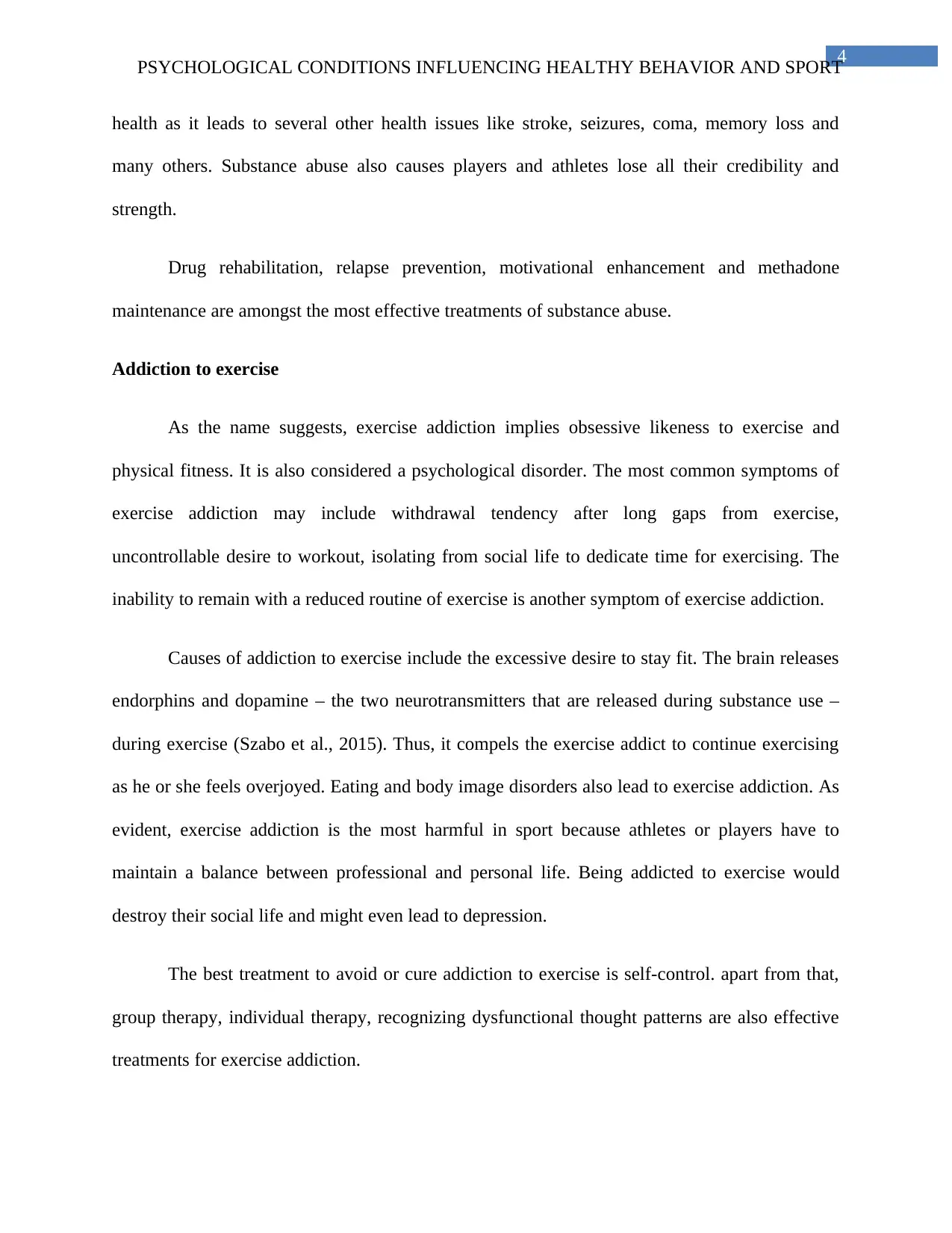
4
PSYCHOLOGICAL CONDITIONS INFLUENCING HEALTHY BEHAVIOR AND SPORT
health as it leads to several other health issues like stroke, seizures, coma, memory loss and
many others. Substance abuse also causes players and athletes lose all their credibility and
strength.
Drug rehabilitation, relapse prevention, motivational enhancement and methadone
maintenance are amongst the most effective treatments of substance abuse.
Addiction to exercise
As the name suggests, exercise addiction implies obsessive likeness to exercise and
physical fitness. It is also considered a psychological disorder. The most common symptoms of
exercise addiction may include withdrawal tendency after long gaps from exercise,
uncontrollable desire to workout, isolating from social life to dedicate time for exercising. The
inability to remain with a reduced routine of exercise is another symptom of exercise addiction.
Causes of addiction to exercise include the excessive desire to stay fit. The brain releases
endorphins and dopamine – the two neurotransmitters that are released during substance use –
during exercise (Szabo et al., 2015). Thus, it compels the exercise addict to continue exercising
as he or she feels overjoyed. Eating and body image disorders also lead to exercise addiction. As
evident, exercise addiction is the most harmful in sport because athletes or players have to
maintain a balance between professional and personal life. Being addicted to exercise would
destroy their social life and might even lead to depression.
The best treatment to avoid or cure addiction to exercise is self-control. apart from that,
group therapy, individual therapy, recognizing dysfunctional thought patterns are also effective
treatments for exercise addiction.
PSYCHOLOGICAL CONDITIONS INFLUENCING HEALTHY BEHAVIOR AND SPORT
health as it leads to several other health issues like stroke, seizures, coma, memory loss and
many others. Substance abuse also causes players and athletes lose all their credibility and
strength.
Drug rehabilitation, relapse prevention, motivational enhancement and methadone
maintenance are amongst the most effective treatments of substance abuse.
Addiction to exercise
As the name suggests, exercise addiction implies obsessive likeness to exercise and
physical fitness. It is also considered a psychological disorder. The most common symptoms of
exercise addiction may include withdrawal tendency after long gaps from exercise,
uncontrollable desire to workout, isolating from social life to dedicate time for exercising. The
inability to remain with a reduced routine of exercise is another symptom of exercise addiction.
Causes of addiction to exercise include the excessive desire to stay fit. The brain releases
endorphins and dopamine – the two neurotransmitters that are released during substance use –
during exercise (Szabo et al., 2015). Thus, it compels the exercise addict to continue exercising
as he or she feels overjoyed. Eating and body image disorders also lead to exercise addiction. As
evident, exercise addiction is the most harmful in sport because athletes or players have to
maintain a balance between professional and personal life. Being addicted to exercise would
destroy their social life and might even lead to depression.
The best treatment to avoid or cure addiction to exercise is self-control. apart from that,
group therapy, individual therapy, recognizing dysfunctional thought patterns are also effective
treatments for exercise addiction.
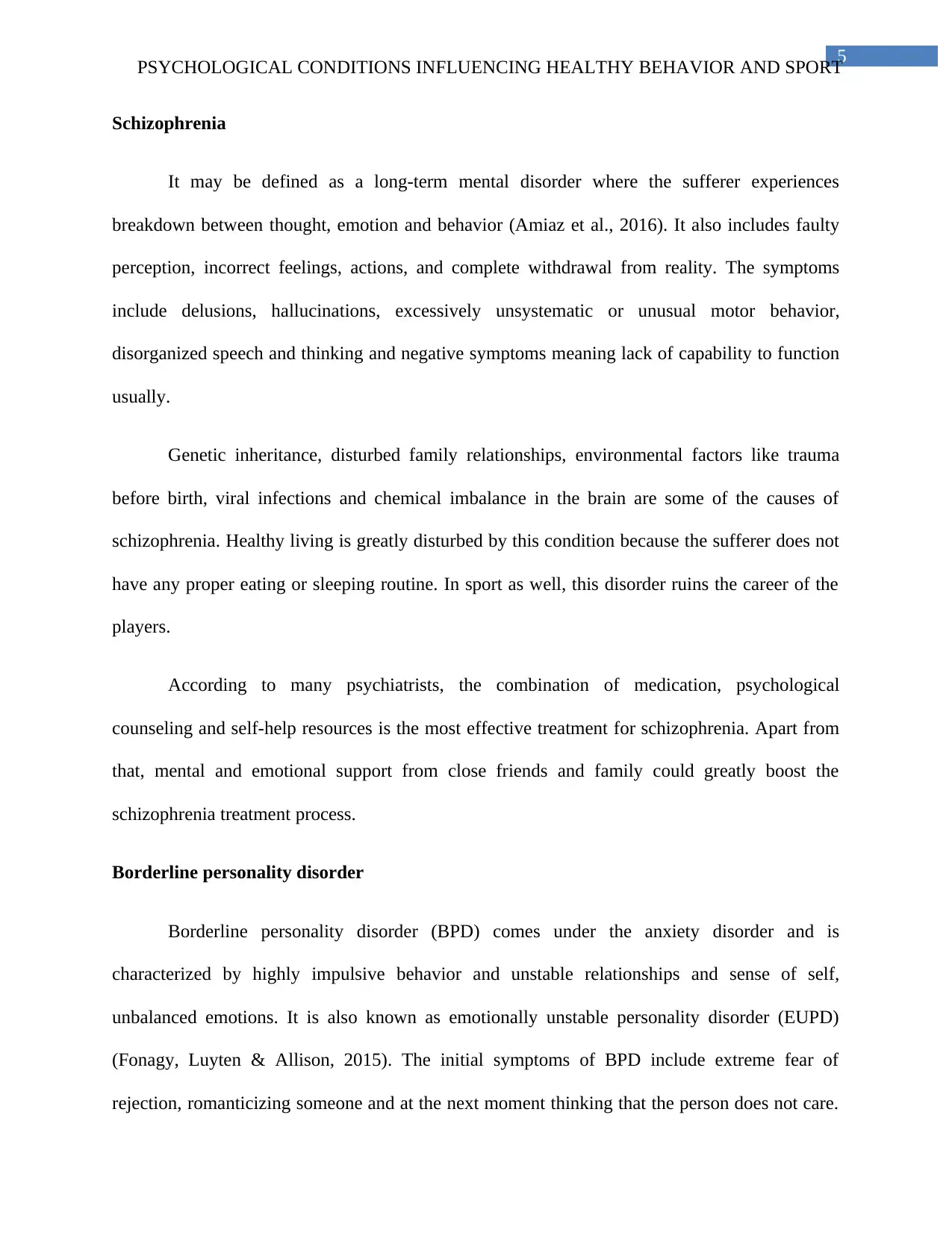
5
PSYCHOLOGICAL CONDITIONS INFLUENCING HEALTHY BEHAVIOR AND SPORT
Schizophrenia
It may be defined as a long-term mental disorder where the sufferer experiences
breakdown between thought, emotion and behavior (Amiaz et al., 2016). It also includes faulty
perception, incorrect feelings, actions, and complete withdrawal from reality. The symptoms
include delusions, hallucinations, excessively unsystematic or unusual motor behavior,
disorganized speech and thinking and negative symptoms meaning lack of capability to function
usually.
Genetic inheritance, disturbed family relationships, environmental factors like trauma
before birth, viral infections and chemical imbalance in the brain are some of the causes of
schizophrenia. Healthy living is greatly disturbed by this condition because the sufferer does not
have any proper eating or sleeping routine. In sport as well, this disorder ruins the career of the
players.
According to many psychiatrists, the combination of medication, psychological
counseling and self-help resources is the most effective treatment for schizophrenia. Apart from
that, mental and emotional support from close friends and family could greatly boost the
schizophrenia treatment process.
Borderline personality disorder
Borderline personality disorder (BPD) comes under the anxiety disorder and is
characterized by highly impulsive behavior and unstable relationships and sense of self,
unbalanced emotions. It is also known as emotionally unstable personality disorder (EUPD)
(Fonagy, Luyten & Allison, 2015). The initial symptoms of BPD include extreme fear of
rejection, romanticizing someone and at the next moment thinking that the person does not care.
PSYCHOLOGICAL CONDITIONS INFLUENCING HEALTHY BEHAVIOR AND SPORT
Schizophrenia
It may be defined as a long-term mental disorder where the sufferer experiences
breakdown between thought, emotion and behavior (Amiaz et al., 2016). It also includes faulty
perception, incorrect feelings, actions, and complete withdrawal from reality. The symptoms
include delusions, hallucinations, excessively unsystematic or unusual motor behavior,
disorganized speech and thinking and negative symptoms meaning lack of capability to function
usually.
Genetic inheritance, disturbed family relationships, environmental factors like trauma
before birth, viral infections and chemical imbalance in the brain are some of the causes of
schizophrenia. Healthy living is greatly disturbed by this condition because the sufferer does not
have any proper eating or sleeping routine. In sport as well, this disorder ruins the career of the
players.
According to many psychiatrists, the combination of medication, psychological
counseling and self-help resources is the most effective treatment for schizophrenia. Apart from
that, mental and emotional support from close friends and family could greatly boost the
schizophrenia treatment process.
Borderline personality disorder
Borderline personality disorder (BPD) comes under the anxiety disorder and is
characterized by highly impulsive behavior and unstable relationships and sense of self,
unbalanced emotions. It is also known as emotionally unstable personality disorder (EUPD)
(Fonagy, Luyten & Allison, 2015). The initial symptoms of BPD include extreme fear of
rejection, romanticizing someone and at the next moment thinking that the person does not care.
⊘ This is a preview!⊘
Do you want full access?
Subscribe today to unlock all pages.

Trusted by 1+ million students worldwide
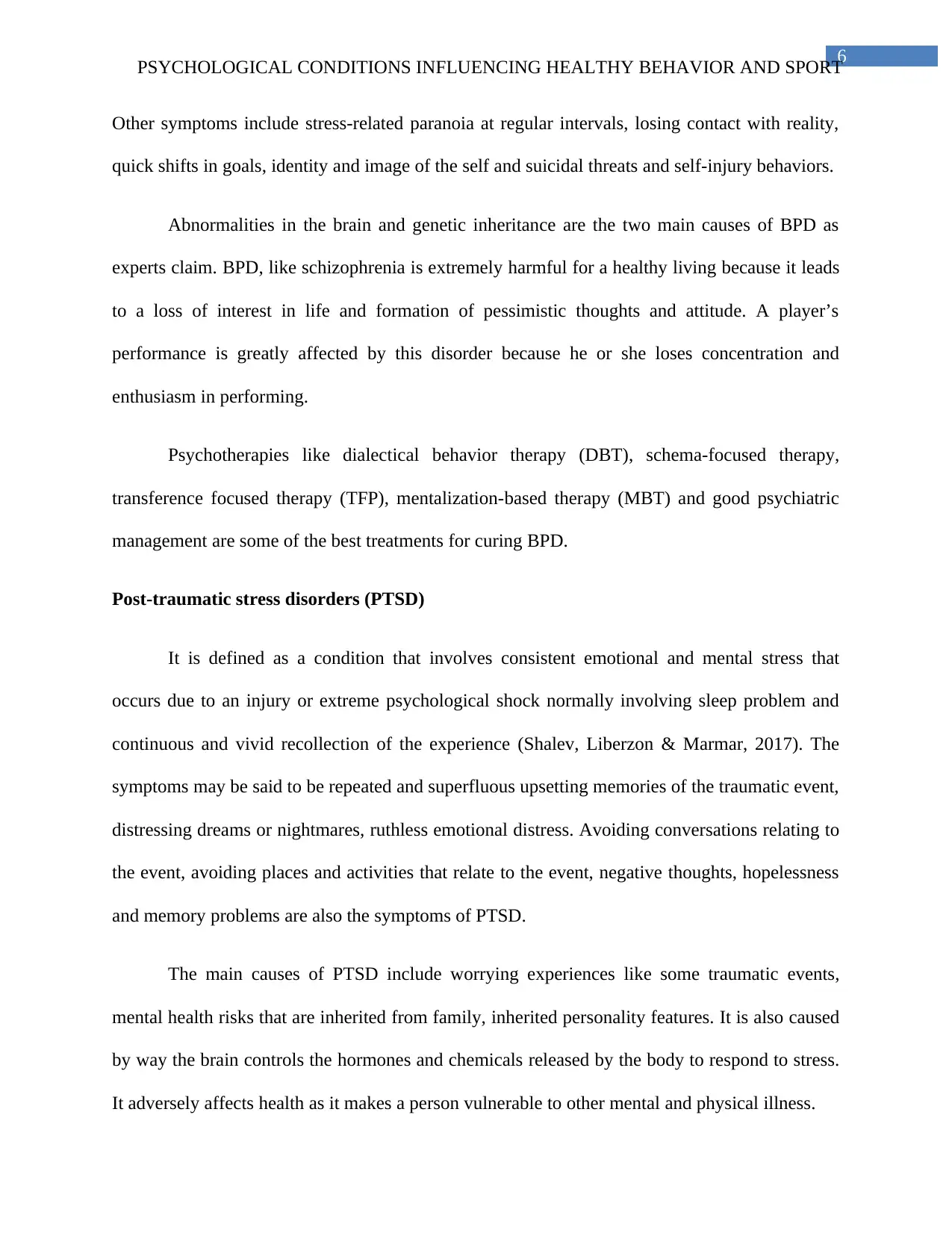
6
PSYCHOLOGICAL CONDITIONS INFLUENCING HEALTHY BEHAVIOR AND SPORT
Other symptoms include stress-related paranoia at regular intervals, losing contact with reality,
quick shifts in goals, identity and image of the self and suicidal threats and self-injury behaviors.
Abnormalities in the brain and genetic inheritance are the two main causes of BPD as
experts claim. BPD, like schizophrenia is extremely harmful for a healthy living because it leads
to a loss of interest in life and formation of pessimistic thoughts and attitude. A player’s
performance is greatly affected by this disorder because he or she loses concentration and
enthusiasm in performing.
Psychotherapies like dialectical behavior therapy (DBT), schema-focused therapy,
transference focused therapy (TFP), mentalization-based therapy (MBT) and good psychiatric
management are some of the best treatments for curing BPD.
Post-traumatic stress disorders (PTSD)
It is defined as a condition that involves consistent emotional and mental stress that
occurs due to an injury or extreme psychological shock normally involving sleep problem and
continuous and vivid recollection of the experience (Shalev, Liberzon & Marmar, 2017). The
symptoms may be said to be repeated and superfluous upsetting memories of the traumatic event,
distressing dreams or nightmares, ruthless emotional distress. Avoiding conversations relating to
the event, avoiding places and activities that relate to the event, negative thoughts, hopelessness
and memory problems are also the symptoms of PTSD.
The main causes of PTSD include worrying experiences like some traumatic events,
mental health risks that are inherited from family, inherited personality features. It is also caused
by way the brain controls the hormones and chemicals released by the body to respond to stress.
It adversely affects health as it makes a person vulnerable to other mental and physical illness.
PSYCHOLOGICAL CONDITIONS INFLUENCING HEALTHY BEHAVIOR AND SPORT
Other symptoms include stress-related paranoia at regular intervals, losing contact with reality,
quick shifts in goals, identity and image of the self and suicidal threats and self-injury behaviors.
Abnormalities in the brain and genetic inheritance are the two main causes of BPD as
experts claim. BPD, like schizophrenia is extremely harmful for a healthy living because it leads
to a loss of interest in life and formation of pessimistic thoughts and attitude. A player’s
performance is greatly affected by this disorder because he or she loses concentration and
enthusiasm in performing.
Psychotherapies like dialectical behavior therapy (DBT), schema-focused therapy,
transference focused therapy (TFP), mentalization-based therapy (MBT) and good psychiatric
management are some of the best treatments for curing BPD.
Post-traumatic stress disorders (PTSD)
It is defined as a condition that involves consistent emotional and mental stress that
occurs due to an injury or extreme psychological shock normally involving sleep problem and
continuous and vivid recollection of the experience (Shalev, Liberzon & Marmar, 2017). The
symptoms may be said to be repeated and superfluous upsetting memories of the traumatic event,
distressing dreams or nightmares, ruthless emotional distress. Avoiding conversations relating to
the event, avoiding places and activities that relate to the event, negative thoughts, hopelessness
and memory problems are also the symptoms of PTSD.
The main causes of PTSD include worrying experiences like some traumatic events,
mental health risks that are inherited from family, inherited personality features. It is also caused
by way the brain controls the hormones and chemicals released by the body to respond to stress.
It adversely affects health as it makes a person vulnerable to other mental and physical illness.
Paraphrase This Document
Need a fresh take? Get an instant paraphrase of this document with our AI Paraphraser
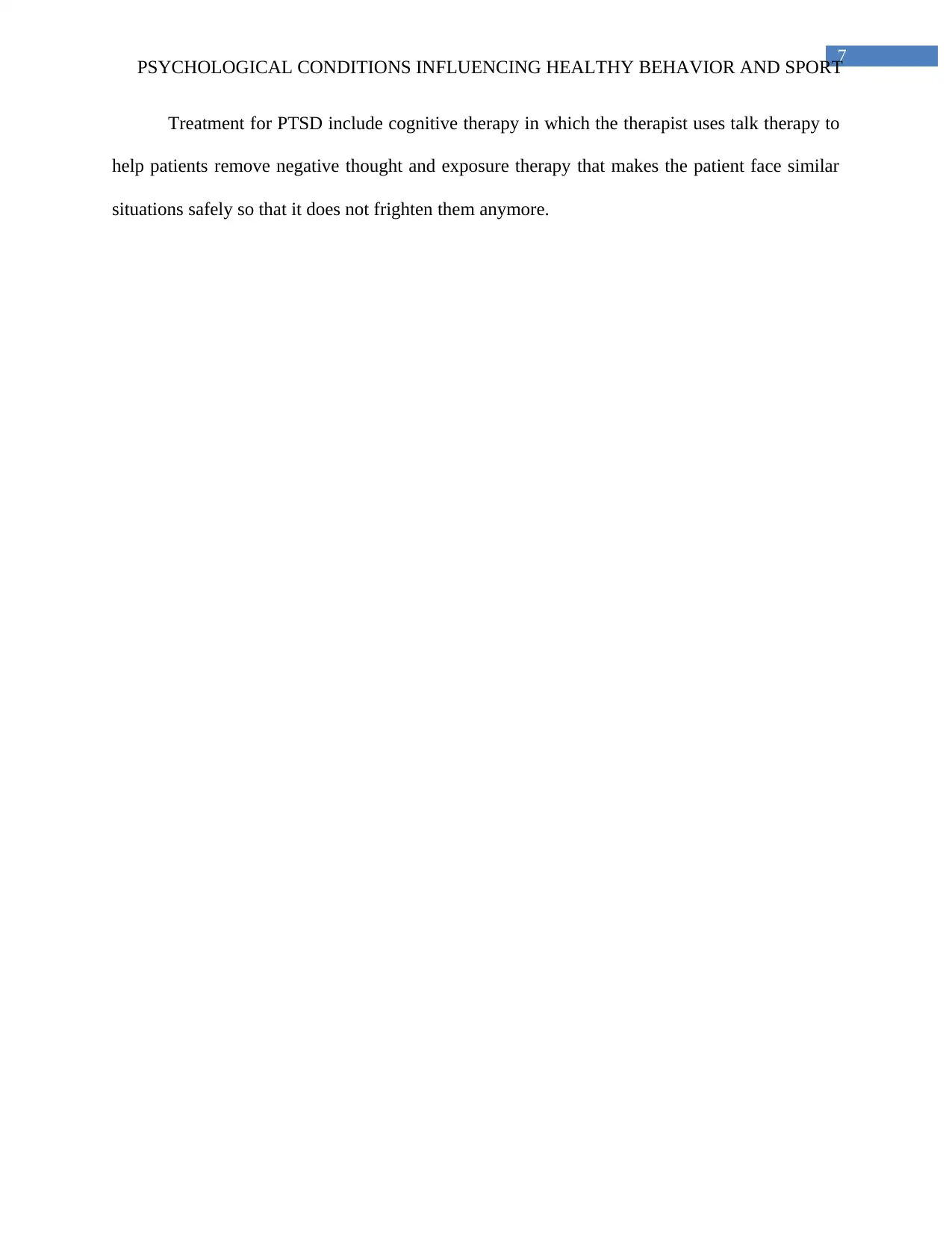
7
PSYCHOLOGICAL CONDITIONS INFLUENCING HEALTHY BEHAVIOR AND SPORT
Treatment for PTSD include cognitive therapy in which the therapist uses talk therapy to
help patients remove negative thought and exposure therapy that makes the patient face similar
situations safely so that it does not frighten them anymore.
PSYCHOLOGICAL CONDITIONS INFLUENCING HEALTHY BEHAVIOR AND SPORT
Treatment for PTSD include cognitive therapy in which the therapist uses talk therapy to
help patients remove negative thought and exposure therapy that makes the patient face similar
situations safely so that it does not frighten them anymore.
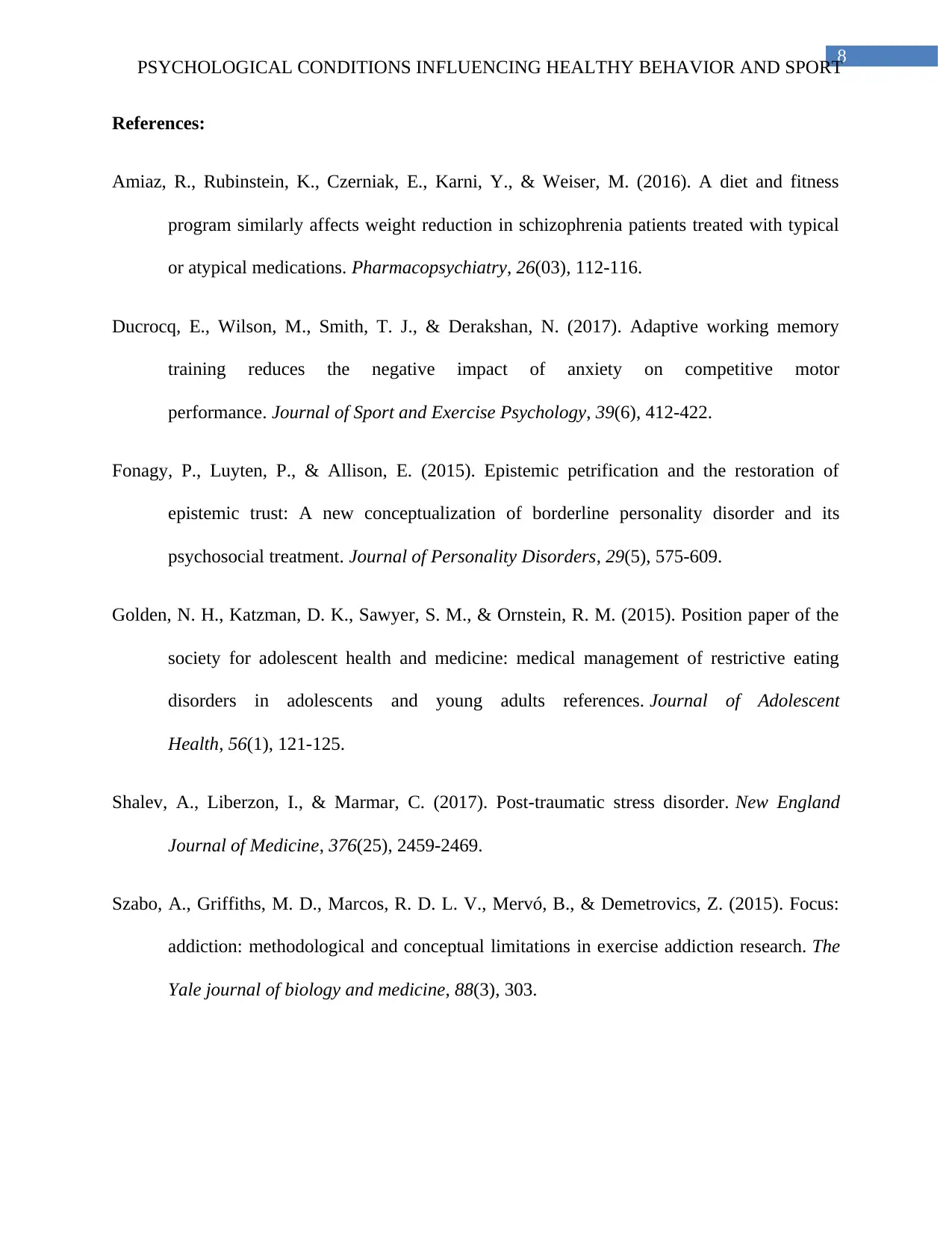
8
PSYCHOLOGICAL CONDITIONS INFLUENCING HEALTHY BEHAVIOR AND SPORT
References:
Amiaz, R., Rubinstein, K., Czerniak, E., Karni, Y., & Weiser, M. (2016). A diet and fitness
program similarly affects weight reduction in schizophrenia patients treated with typical
or atypical medications. Pharmacopsychiatry, 26(03), 112-116.
Ducrocq, E., Wilson, M., Smith, T. J., & Derakshan, N. (2017). Adaptive working memory
training reduces the negative impact of anxiety on competitive motor
performance. Journal of Sport and Exercise Psychology, 39(6), 412-422.
Fonagy, P., Luyten, P., & Allison, E. (2015). Epistemic petrification and the restoration of
epistemic trust: A new conceptualization of borderline personality disorder and its
psychosocial treatment. Journal of Personality Disorders, 29(5), 575-609.
Golden, N. H., Katzman, D. K., Sawyer, S. M., & Ornstein, R. M. (2015). Position paper of the
society for adolescent health and medicine: medical management of restrictive eating
disorders in adolescents and young adults references. Journal of Adolescent
Health, 56(1), 121-125.
Shalev, A., Liberzon, I., & Marmar, C. (2017). Post-traumatic stress disorder. New England
Journal of Medicine, 376(25), 2459-2469.
Szabo, A., Griffiths, M. D., Marcos, R. D. L. V., Mervó, B., & Demetrovics, Z. (2015). Focus:
addiction: methodological and conceptual limitations in exercise addiction research. The
Yale journal of biology and medicine, 88(3), 303.
PSYCHOLOGICAL CONDITIONS INFLUENCING HEALTHY BEHAVIOR AND SPORT
References:
Amiaz, R., Rubinstein, K., Czerniak, E., Karni, Y., & Weiser, M. (2016). A diet and fitness
program similarly affects weight reduction in schizophrenia patients treated with typical
or atypical medications. Pharmacopsychiatry, 26(03), 112-116.
Ducrocq, E., Wilson, M., Smith, T. J., & Derakshan, N. (2017). Adaptive working memory
training reduces the negative impact of anxiety on competitive motor
performance. Journal of Sport and Exercise Psychology, 39(6), 412-422.
Fonagy, P., Luyten, P., & Allison, E. (2015). Epistemic petrification and the restoration of
epistemic trust: A new conceptualization of borderline personality disorder and its
psychosocial treatment. Journal of Personality Disorders, 29(5), 575-609.
Golden, N. H., Katzman, D. K., Sawyer, S. M., & Ornstein, R. M. (2015). Position paper of the
society for adolescent health and medicine: medical management of restrictive eating
disorders in adolescents and young adults references. Journal of Adolescent
Health, 56(1), 121-125.
Shalev, A., Liberzon, I., & Marmar, C. (2017). Post-traumatic stress disorder. New England
Journal of Medicine, 376(25), 2459-2469.
Szabo, A., Griffiths, M. D., Marcos, R. D. L. V., Mervó, B., & Demetrovics, Z. (2015). Focus:
addiction: methodological and conceptual limitations in exercise addiction research. The
Yale journal of biology and medicine, 88(3), 303.
⊘ This is a preview!⊘
Do you want full access?
Subscribe today to unlock all pages.

Trusted by 1+ million students worldwide
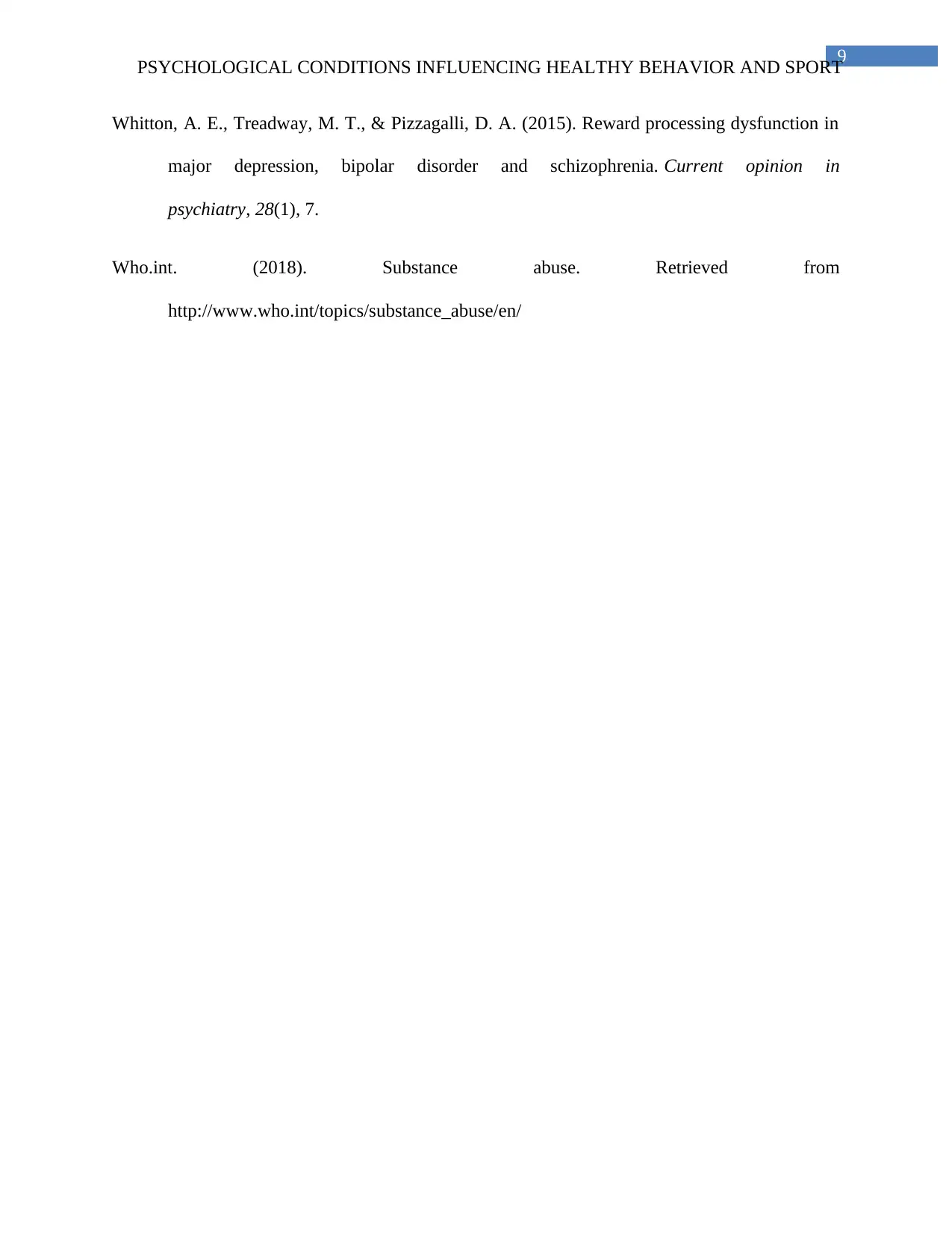
9
PSYCHOLOGICAL CONDITIONS INFLUENCING HEALTHY BEHAVIOR AND SPORT
Whitton, A. E., Treadway, M. T., & Pizzagalli, D. A. (2015). Reward processing dysfunction in
major depression, bipolar disorder and schizophrenia. Current opinion in
psychiatry, 28(1), 7.
Who.int. (2018). Substance abuse. Retrieved from
http://www.who.int/topics/substance_abuse/en/
PSYCHOLOGICAL CONDITIONS INFLUENCING HEALTHY BEHAVIOR AND SPORT
Whitton, A. E., Treadway, M. T., & Pizzagalli, D. A. (2015). Reward processing dysfunction in
major depression, bipolar disorder and schizophrenia. Current opinion in
psychiatry, 28(1), 7.
Who.int. (2018). Substance abuse. Retrieved from
http://www.who.int/topics/substance_abuse/en/
1 out of 10
Related Documents
Your All-in-One AI-Powered Toolkit for Academic Success.
+13062052269
info@desklib.com
Available 24*7 on WhatsApp / Email
![[object Object]](/_next/static/media/star-bottom.7253800d.svg)
Unlock your academic potential
Copyright © 2020–2026 A2Z Services. All Rights Reserved. Developed and managed by ZUCOL.





